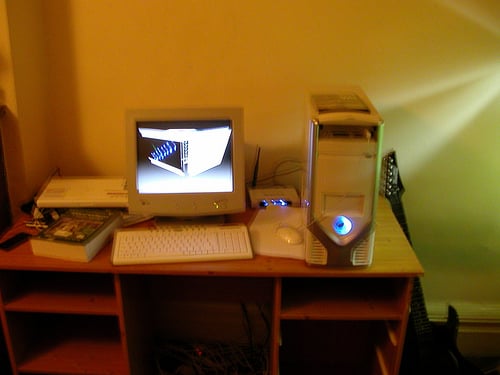Kingsley Idehen made an interesting blog post recently in a question and answer format (see his blog post: “The future of the desktop“), so i’ve decided to provide my own answers:
Q: Is the desktop of the future going to just be a web-hosted version of the same old-fashioned desktop metaphors we have today?
A: In terms of becoming web-based the desktop as we know it will not change much at the very surface level. I doubt that a web-hosted version of the old-fashioned Operating System would ever be stable enough (some of you will know if you’ve ever used a “
dumb-terminal“). The Operating System, however, is likely to become more and more web-aware; taking up more and more of the challenge of “Web Universal Plug and Play”.
Q: The desktop of the future is going to be a hosted web service
A: False. I think it’ll be totally the inverse, I’m even inclined to say that everybody would host their own space which is interconnected with other services across the web…. it won’t be a “hosted web service”.
Q: The Browser is Going to Swallow Up the Desktop
A: Interestingly this is where Microsoft were heading in the right direction… the file system explorer was also the internet explorer, just by changing the location in the address bar you were capable of switching from file mode to web mode. (takes quite a lot for me to admit that). If you have a fully integrated system then you can take full advantage of everything. The web of documents, is a web of documents…. what are file systems good at manipulating… documents (and also viewing metadata)! So is the browser going to swallow up the desktop? No… it already has.
Q: The focus of the desktop will shift from information to attention
A: No information is vital…. attention will become an interesting part of search, but it’s actually has to maximise utilisation of information (aka knowledge) in order to do it’s best (just as any other program needs to do). This effects both desktop systems and browser systems.
Q: Users are going to shift from acting as librarians to acting as daytraders
A: People are always going to categorise things, and other people will always want things categorised. How can you expect someone to trawl through their bookmarks without them being categorised? However, things will become more automised when interlinked with other interlinked data…. therefore users are likely to become Personalised Knowledge Managers controlling what knowledge they possess and how they want their intelligent agents to deal with it.
Q: The Webtop will be more social and will leverage and integrate collective intelligence
A: OK, first off… really bad terminology usage going on here. Webtop? That’s a bad name… and for something which I don’t think will become widespread. Also collective intelligence is actually about agents having specific knowledge. The web-aware desktop will slowly include more and more agent technology (see some of the Apple/Xerox work on Intelligent Agents and Intelligent User Interfaces done in the late 80s and early 90s) and will certainly encorporate
Linked Data technologies (see the Semantic Desktop and OpenLink Data Spaces).
Q: The desktop of the future is going to have powerful semantic search and social search capabilities built-in
A: Yes, I’ve mentioned this in most of my answers above.
Q: Interactive shared spaces will replace folders
A: I agree with Kingsley when he says “Data Spaces and their URIs (Data Source Names) replace everything. You simply choose the exploration metaphor that best suits you space interaction needs”… there is nothing more to say than that…. a URI is the key to a data space, a data space is where your data objects are stored which also have their own URIs.
Q: The Portable Desktop
A:The portable desktop (or ubiquitous desktop) will emerge as a mobilisation of a Linked Data desktop…. all depends on hardware at the moment. This will go beyond mobile phones, mobile computers (such as the Asus EEE) and PDA’s.
Q: The Smart Desktop
A: Yes, this is what I’ve been discussing.
Q: Federated, open policies and permissions
A: Have we not got the technologies for these points already 
Q: The personal cloud
A: Can’t add anything more to Kingsley’s point “
Personal Data Spaces plugged into Clouds (Intranet, Extranet, Internet).”
Q: The WebOS
A: There are some interesting implementations of the WebOS idea out there, and a few years I was actually considering building one using Ruby On Rails and AJAX….. really we don’t need to focus on this right now, it’s more about interlinking things (aka Linked Data)
Q: Who is most likely to own the future desktop?
A: I have nothing more to add to Kingsley’s comment: “You! And all you need is a
URI (an ID or Data Source Name for “Entity You”) and a Profile Page (a place where “Entity You” is Describe by You).”

